
In this guide will explain to you everything you need to know about Florida Personal Injury Law from A-Z.
Fill out the form for a downloadable PDF version of the guide you can reference later.
Florida personal injury laws hold individuals, businesses, and governments accountable when their negligence or intentional actions injure others. These laws pertain to the civil side of the legal system, so no criminal penalties are attached. Instead, defendants must provide monetary compensation to the victim.
Some personal injury or wrongful death claims have a parallel case in criminal court, though they represent a minority. Most personal injury cases have a basis in an accident rather than a crime. However, if your injury resulted from a crime, you can pursue the perpetrator in civil and criminal court. Each case exists separately, and the result of one has no bearing on the outcome of the other.
Not all people have liability. Liability only exists when a legal duty of care applies. Drivers have an assumed duty of care toward others while operating a motor vehicle. Likewise, homeowners have a duty of care toward guests.
Florida courts establish a duty of care through the common law process. Under this system, precedents rule. The courts follow previous rulings in deciding cases. For example, extensive case law establishes drivers’ and homeowners’ duty of care.
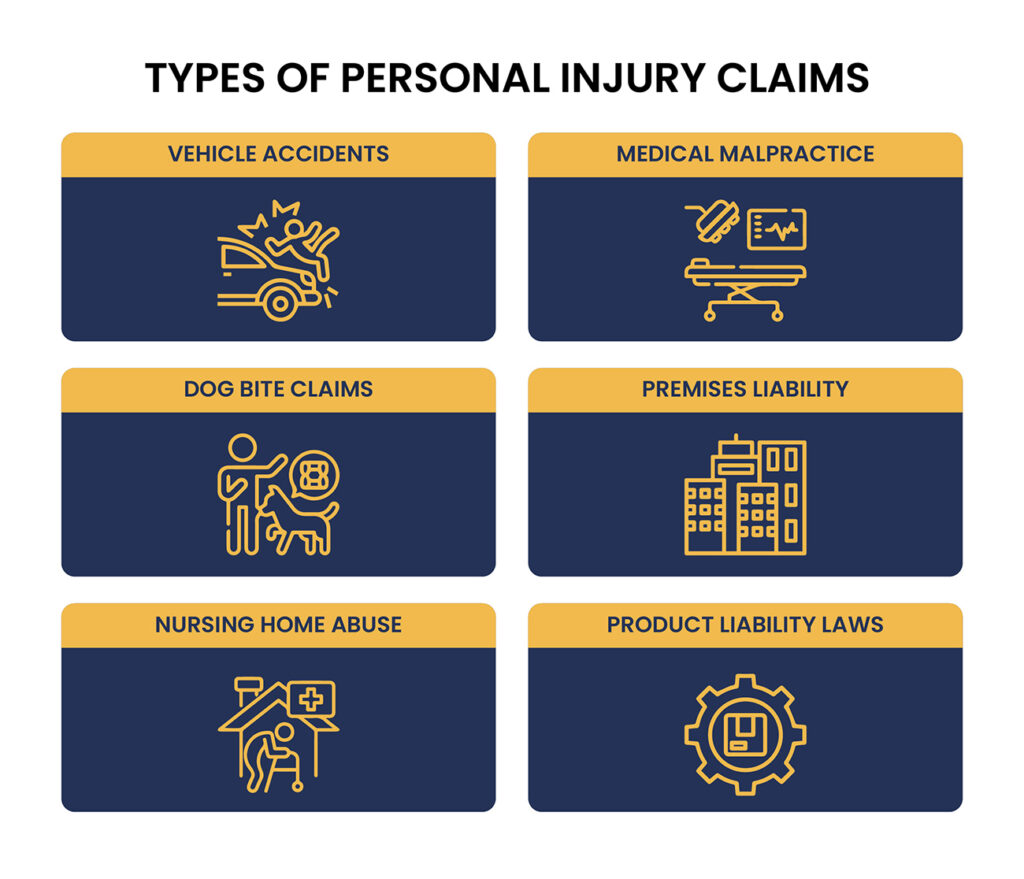
A claim can arise from almost any incident that causes an injury. Whether the plaintiff wins depends on his evidence of the defendant’s responsibility and existing case law. Most kinds of accidents have precedents; however, a precedent-setting case may ensure if a unique situation exists.
The following represent the most common types of personal injury claims:
If you’ve driven recently in the Fort Lauderdale region, you can understand why vehicle accidents account for the largest share of personal injury cases. Almost everyone drives or rides in vehicles, the streets bear heavy traffic, and many drivers make bad decisions or proceed recklessly.
Florida law has multiple statutes relating to auto accidents, such as requirements for auto insurance and remaining at the scene of a collision. In addition, as with other personal injury claims, auto accident cases are subject to comparative negligence, which allows for the splitting of liability when both parties contributed to the cause.
For example, many accidents happen because the defendant fails to yield the right of way. Clearly, the accident is this person’s fault. However, the plaintiff may have partial fault, such as if he was speeding. In this example, the court is likely to find the defendant majority at fault but assign some liability to the plaintiff, such as 20%.
Medical malpractice cases make up a large share of personal injury claims. They occur when a healthcare provider departs from accepted medical standards, and a patient suffers a bad outcome as a result. Florida law recognizes that all hospitals, doctors, nurses, and other healthcare providers have a duty of care that requires adhering to accepted standards. The key to winning resides in proving the breach of this duty and relating it to specific harms.
Dog bites serve as another example of a common personal injury. Florida law establishes a duty of care for dog owners to others that come into contact with their animal. If the dog bites, the owner is liable. It is up to the owner to properly train and restrain the dog through leashes, and fences, and keep it off other people’s property or public areas without supervision.
Dog bite claims differ because the law assumes negligence on the owner’s part. Therefore, the plaintiff need not prove that the owner was negligent. Nonetheless, this presumption does not mean the plaintiff wins automatically.
Certain exceptions can result in a case dismissal. For example, the defendant could claim the dog was not his or that a different dog bit the plaintiff. Also, no duty of care exists when a dog bites a person committing a crime, such as assault or burglary.
Premises liability claims hold owners liable for injuries sustained by others on their property. To succeed, a premises liability case must prove the owner’s negligence. Without negligence, the case fails even if the injury undoubtedly happened on the premises.
For instance, someone who slips on a wet floor at a business may have a negligence claim. The business bears responsibility for keeping the floor free of hazards. Then again, if a customer trips of his own accord, there is no negligence and, therefore, no case.
Unfortunately, senior citizens often receive substandard care and find themselves subject to abuse by caregivers. This vulnerable population cannot fight back like a younger adult, often resulting in an extended pattern of neglect and abuse that kills. Typical forms of nursing home abuse include hitting patients, stealing their personal property, denying medical care, and failing to provide adequate nutrition and hydration.
Defective products can leave people hospitalized, in pain, and unable to work. Product liability claims often stem from vehicles and auto parts, bicycles, housewares, yard tools, construction equipment, and other potentially dangerous products.
Personal injury law covers a lot of ground, from auto accidents to product liability and from minor injuries to wrongful death. Florida law enshrines the right of plaintiffs to seek recompense for their damages. The responsible parties must make the victim whole.
Each year, thousands of Floridians suffer severe personal injuries that require extensive medical care, leave them unable to work, and cause tremendous pain and suffering. Often, these injuries result from someone else’s negligence. When another’s actions or inactions cause you harm, you have the right to seek compensation under Florida Law.
The types of personal injury cases range from run-of-the-mill minor auto accidents to tragic wrongful death cases based on nursing home neglect and abuse. The most common include the following:
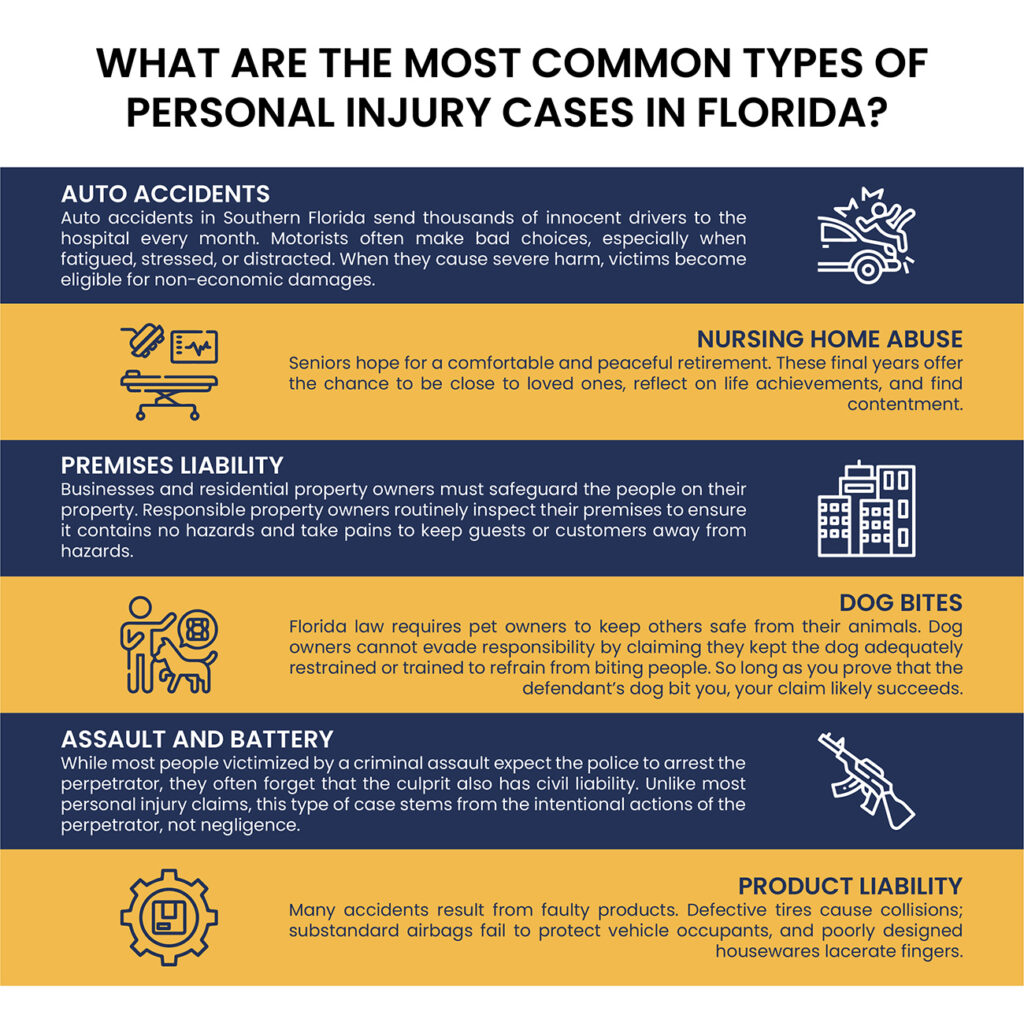
Auto accidents in Southern Florida send thousands of innocent drivers to the hospital every month. Motorists often make bad choices, especially when fatigued, stressed, or distracted. When they cause severe harm, victims become eligible for non-economic damages.
Florida is a no-fault auto accident state. This policy requires insurance companies to pay economic damages to their customers regardless of fault. However, victims can seek non-economic damages, such as pain and suffering, in court.
But auto accidents leave room for defendants to argue comparative negligence. Many accidents have multiple causes. For instance, the primary cause may be the defendant’s failure to yield to oncoming traffic while completing a left-hand turn. However, the other driver may have been distracted, resulting in a failure to brake to avoid an accident.
Courts must determine how to split the liability when fault seems indicated for both sides. Comparative negligence allows juries to allocate damages in any proportion. For example, they may find the motorist with primary liability 75% at fault and the other motorist 25% liable. In that case, the driver with lesser liability receives 75% of his damages.
Insurance companies often assert comparative negligence when no reasonable rationale for this argument exists. They hope to force a lower settlement by dragging out the case, tempting plaintiffs with financial challenges to accept less than adequate compensation.
Personal injury lawyers fight against these specious arguments by finding strong evidence, negotiating from strength, and relentlessly pursuing cases.
Seniors hope for a comfortable and peaceful retirement. These final years offer the chance to be close to loved ones, reflect on life achievements, and find contentment.
Nursing home abuse robs victims of the peace, joy, and respect they have earned. Instead of being treated with dignity, they suffer insults, assaults, thefts, malnutrition, dehydration, and defilement. These monstrous humiliations are immoral and illegal. Personal injury attorneys fight to bring perpetrators to justice.
Businesses and residential property owners must safeguard the people on their property. Responsible property owners routinely inspect their premises to ensure it contains no hazards and take pains to keep guests or customers away from hazards. When they neglect to protect those on their property, they incur premises liability.
Most homeowners have insurance policies that cover this type of liability. Additionally, businesses carry commercial liability policies that pay plaintiffs who bring premises liability suits. Because of this, plaintiffs have an excellent chance of collecting a settlement.
However, before they can take home a check, they must prove that the owner acted negligently. If the injury is at no fault of the owner, no premises liability claim exists.
For example, a homeowner who allowed guests to use an unrepaired stairway may have liability if someone falls. On the other hand, if a person simply trips on a perfectly good step, the owner may have no responsibility.
Florida law requires pet owners to keep others safe from their animals. Dog owners cannot evade responsibility by claiming they kept the dog adequately restrained or trained to refrain from biting people. So long as you prove that the defendant’s dog bit you, your claim likely succeeds.
As with premises liability, most defendants have an insurance policy that covers dog bite liability. For instance, an individual may have this coverage as part of a homeowner’s insurance policy. Likewise, a business that has guard dogs likely has insurance in case their animals mistakenly bite an innocent person.
While most people victimized by a criminal assault expect the police to arrest the perpetrator, they often forget that the culprit also has civil liability. Unlike most personal injury claims, this type of case stems from the intentional actions of the perpetrator, not negligence. Because of this, juries tend to be sympathetic toward the plaintiff and want to hold the bad actor responsible.
Because they involve malice, assault and battery cases can yield punitive damages. Punitive damages are meant to deter others from committing similar acts, and a large verdict against an assailant sends a strong message.
Many accidents result from faulty products. Defective tires cause collisions; substandard airbags fail to protect vehicle occupants, and poorly designed housewares lacerate fingers.
Manufacturers must ensure the safety of their products when used as intended and recall dangerous products from the market before they hurt someone. Failure to do so justifies a personal injury lawsuit.
Many types of incidents lead to personal injury. Regardless of how the injury happened, if there was negligence, recklessness, or intentional action on the part of another person or business, you may have a personal injury claim.
Florida law establishes a four-year statute of limitations for most personal injury claims. The time limit in the Sunshine State is longer than many others. For example, California allows only two years.
While this extended statute of limitations provides good news for personal injury plaintiffs, it is never wise to delay filing a claim longer than necessary. Four years allows much time for evidence to disappear and witnesses to forget. If you wait to file a case until the statute of limitations is near, the production of evidence can prove more difficult, weakening your position.
Also, on average, personal injury claims take one to two years to settle, and trial cases add several years to this timeline. A plaintiff who waits four years to file a claim may receive no compensation for 5 to 6 years or more after the incident.
For most injured people, this represents an unacceptably long time without compensation for out-of-pocket medical expenses (except in auto accident cases), suffering lost income and enduring a diminished ability to live a whole life.
Instead of waiting, consult an attorney as soon as possible. Litigation is a slow process, and the sooner you start it, the sooner you can defray your injury’s economic and non-economic costs.
Understanding the difference between filing a lawsuit and an insurance claim is essential. Most insurance claims must be filed promptly or face rejection. Failure to file a timely claim can destroy your ability to pursue compensation in court, even if you meet the four-year statute of limitations.
Also, while four years serves as the typical statute of limitations, different deadlines apply to varying situations. In some cases, these exceptions shorten the statute of limitations, while others extend it.
Different statutes of limitations apply in the following situations:
Plaintiffs file personal injury lawsuits in Florida state court. These lawsuits name as defendants the individual(s) or business(s) that caused the accident and, when applicable, their insurers. Most defendants have an auto-, homeowners-, or commercial liability policy covering the damages.
As a result, the typical case becomes a battle between the plaintiff’s legal team and the insurer’s.
After an injury, you must review your insurance documents to know the deadlines for filing a claim. This is particularly important for auto claims. Filing a claim with your insurer within the timeframe secures your right to pursue full damages until the statute of limitations expires.
Also, Florida law requires those injured in an accident to receive medical care within 14 days or forego the right to pursue reimbursement for expenses. Because Florida is a no-fault car insurance state, your auto insurer pays your medical costs regardless of fault. You must file a claim and seek medical treatment within the allotted time to collect compensation for these harms.
Though most cases involve an insurer, you can pursue a lawsuit against an uninsured plaintiff, but you need to ensure that they are not judgment-proof (unable to pay). Also, some personal injury debts can be discharged in bankruptcy.
Unfortunately, those without insurance tend to have limited income and assets, making the filing of a claim fruitless. For this reason, it’s always advisable to carry substantial uninsured and underinsured motorist protection and health-, disability-, and homeowner’s or renter’s insurance. Some households also need the protection of umbrella insurance.
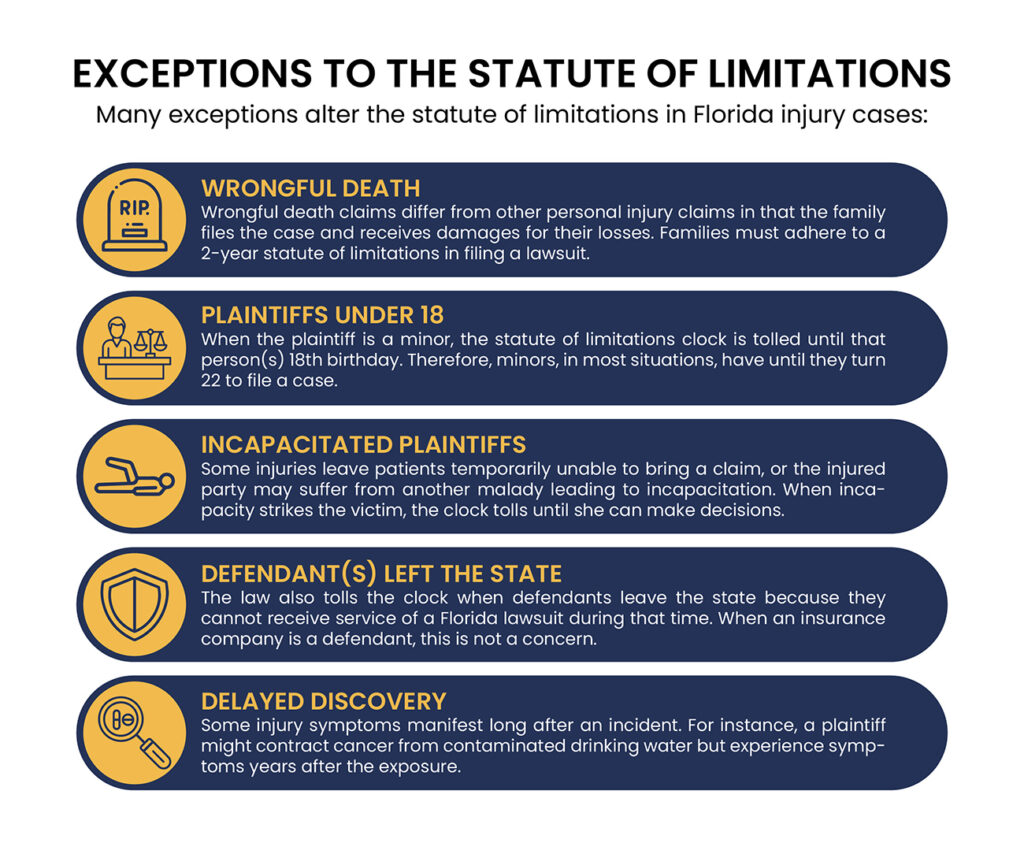
Many exceptions alter the statute of limitations in Florida injury cases:
Wrongful death claims differ from other personal injury claims in that the family files the case and receives damages for their losses. Families must adhere to a 2-year statute of limitations in filing a lawsuit.
When the plaintiff is a minor, the statute of limitations clock is tolled until that person(s) 18th birthday. Therefore, minors, in most situations, have until they turn 22 to file a case. However, this timeline can be shorter or longer if the case has other factors that change the statute of limitations.
Some injuries leave patients temporarily unable to bring a claim, or the injured party may suffer from another malady leading to incapacitation. When incapacity strikes the victim, the clock tolls until she can make decisions.
The law also tolls the clock when defendants leave the state because they cannot receive service of a Florida lawsuit during that time. When an insurance company is a defendant, this is not a concern. However, if you were pursuing an uninsured defendant, you may need the statute of limitations extension.
Some injury symptoms manifest long after an incident. For instance, a plaintiff might contract cancer from contaminated drinking water but experience symptoms years after the exposure. In that case, the four-year clock starts when the plaintiff becomes aware of the condition.
Other factors may alter the statute of limitations in your case. Therefore, it’s advisable never to assume the time has passed. A personal injury lawyer can confirm whether the statutes have run in your case. But it is always wise to consult an attorney as soon after an injury as possible to build a strong case and avoid missing any deadlines.
Florida law allows personal injury victims to pursue economic, non-economic, and punitive damages. Economic damages include medical bills, lost wages, and other financial harms, while non-economic damages cover intangible losses, such as pain and suffering. Punitive damages apply only if the defendant caused the injury through outrageous misconduct.
Auto accidents differ somewhat in available damages because Florida is a “no-fault” car insurance state. Under this policy, insurers pay their customer’s medical bills regardless of fault. Accordingly, when medical bills are the only legal entitlement, the victim must rely on his own personal injury protection (PIP) policy. PIP policies also cover lost income.
However, the opposing insurer often refuses to pay a fair settlement for non-economic damages, including pain and suffering. When this occurs, a lawsuit may be the only method that brings about total compensation for the victim.
Florida’s “no-fault” car insurance law presents a double-edged sword for injury victims. On the plus side, your insurer pays your economic damages regardless of fault. Also, when another driver hits you, you avoid a protracted legal fight to receive those damages. However, you may end up with less than states that do not have a no-fault system because of Florida’s auto insurance damages caps.
PIP policies in Florida pay the following benefits:
These limits often leave victims with substantial out-of-pocket expenses. However, if you have serious injuries, you can bring a lawsuit for non-economic damages that more than compensate for these out-of-pocket costs.
For wrongful death cases, the family can bring a lawsuit for the damages they suffered because of losing a loved one. These damages can total in the hundreds of thousands or millions.
Not all car accident claims qualify for non-economic damages. The law strictly limits the pursuit of these damages to the following circumstances:
When one or more of these criteria is met, the plaintiff can bring a claim for non-pecuniary damages that include the following:
Injuries of this magnitude cause tremendous pain for the victim. Physical agony and the inability to return to their former life take a terrible toll on victims.
Life offers many enjoyments, including spending time with loved ones, pursuing career goals, reaching financial milestones, participating in cherished activities, and many others. Significant compensation is warranted when an injury robs a person of their joy in living.
Physical injuries come with emotional distress. Being hurt, facing medical bills, and possibly becoming disabled are challenges that distress anyone. In addition, many injured people become isolated, leading to additional emotional pain.
Punitive damages rarely apply to car accident cases. However, the courts may apply them to a defendant who caused a severe accident through terrible misconduct.
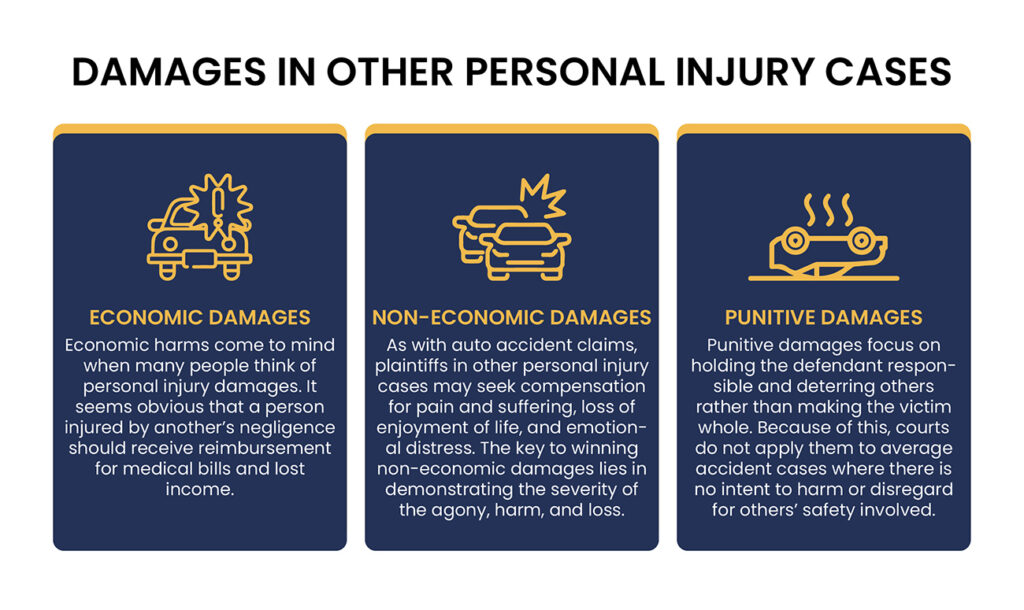
Other types of personal injury claims, such as slip and fall cases, allow you to take the defendant or insurance company to court for economic, non-economic, and punitive damages.
Economic harms come to mind when many people think of personal injury damages. It seems obvious that a person injured by another’s negligence should receive reimbursement for medical bills and lost income. With economic damages covered, the victim avoids paying out of pocket for someone else’s mistake.
Therefore, personal injury claimants can pursue full reimbursement of their medical expenses related to the accident. They can also claim lost income, including wages, salaries, benefits, business-, and self-employment income.
As with auto accident claims, plaintiffs in other personal injury cases may seek compensation for pain and suffering, loss of enjoyment of life, and emotional distress. The key to winning non-economic damages lies in demonstrating the severity of the agony, harm, and loss. Medical records, witness testimony, and a journal detailing pain and suffering help to illustrate the justice of non-economic damages.
Punitive damages focus on holding the defendant responsible and deterring others rather than making the victim whole. Because of this, courts do not apply them to average accident cases where there is no intent to harm or disregard for others’ safety involved. However, exceptional circumstances based on intentional actions or extreme recklessness can yield punitive damages.
Florida accident victims can seek economic, non-economic, and punitive damages. However, Florida’s no-fault car insurance law curtails the ability to pursue damages in auto accident cases. As a result, punitive damages apply only in rare circumstances. For a complete understanding of the damages Florida law may entitle you to, consult a personal injury attorney.
Personal injury attorneys perform vital services for injury victims. Severe physical, psychological, and emotional harms have devastating consequences, often leading to astronomical medical bills and the loss of essential income. In addition, many victims experience pain lasting for years or a lifetime. Personal injury lawyers fight to obtain all the compensation due to their clients.
A lot rides on a personal injury claim. Hiring the right lawyer makes the difference between collecting all your damages and ending up with a short settlement.
Consider the following factors when choosing a personal injury lawyer:
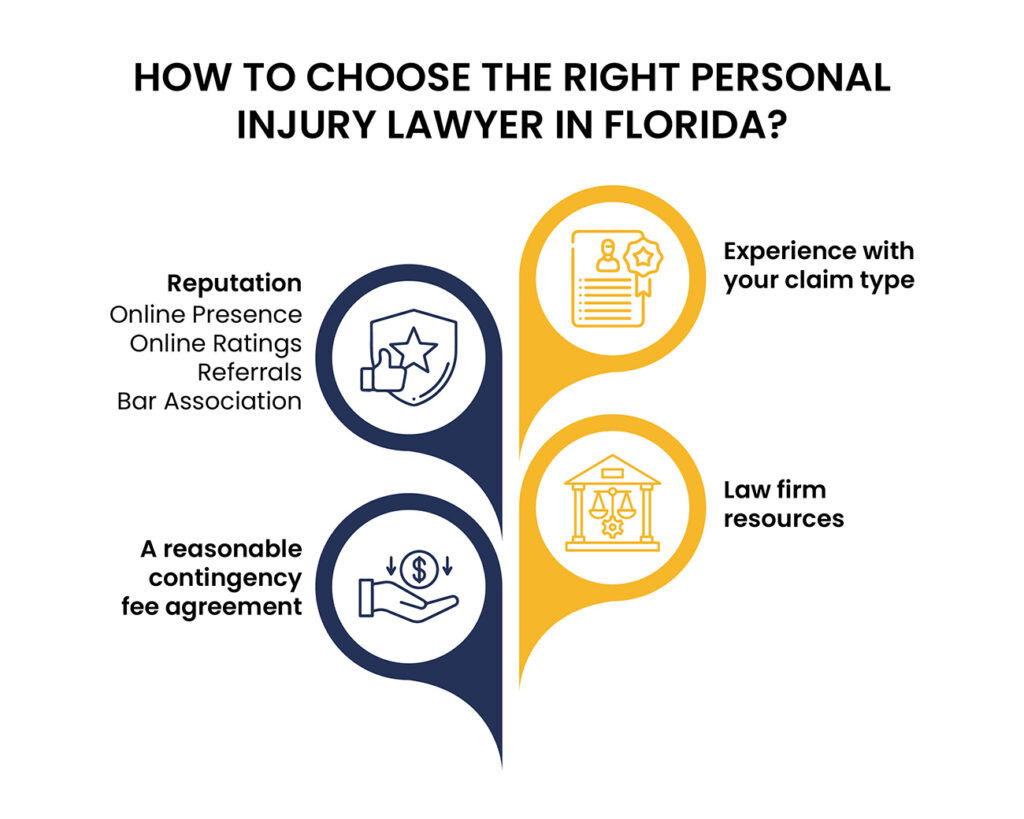
Personal injury law is a specialty, so you want to select a lawyer with substantial experience in this type of practice. Florida law requires plaintiffs to prove specific elements of a claim. An experienced lawyer has a keen sense of evidence a court will accept and juries find convincing. By uncovering clear and convincing evidence, your personal injury attorney puts you in a strong negotiation position.
It’s also key to consider the types of personal injury cases a lawyer has handled. Most have experience with auto accidents and slip-and-fall cases. However, some claims involve specialized knowledge.
For example, truck accidents differ from car-to-car collisions. Usually, multiple defendants have liability, including the driver, the trucking company, and often the truck manufacturer and cargo loaders. Therefore, achieving the best result requires investigating the cause of the accident to determine where the blame resides.
In trucking accidents, the root cause may be unknown at first. For instance, if neglected maintenance on the part of the trucking company contributed to the accident, an investigation is needed to establish this.
A personal injury attorney with specific truck accident experience has a firm grasp on how to build this type of case.
Lawyers value their reputations for good reason. Well-regarded personal injury lawyers with impressive records have leverage in negotiations. The defense knows they face a disadvantage in litigation and may be willing to settle sooner for more.
You can assess an attorney’s reputation through several research points:
Attorneys post a great deal of biographical- and career history on their websites. Their firm’s site offers an overview of their practice areas, outstanding successes, employment history, education, and philosophy. A review of this material will provide a picture of the attorney’s record of how he works with clients.
Many legal websites show star ratings for individual lawyers. Former clients and colleagues post these ratings and often leave insightful comments. Clients can tell you how the attorney handled the case and the results. Colleagues give you a window into how other lawyers view the attorney’s skills and professionalism.
Ask people you know for referrals if they know any personal injury lawyers. For example, inquire from a friend who went through a personal injury case or someone you know in the legal field.
Bar associations have the responsibility of disciplining attorneys. In addition to skill, drive, and reputation, you want an attorney who is ethical and treats clients right. The bar association can tell you if the attorney has faced any disciplinary action, and, if so, what it involved.
Personal injury lawyers work cases on contingency. As a result, they must invest in each case with the goal of obtaining settlements and judgments to outweigh their expenses. A claim that requires investigation, expert witnesses, extensive depositions, and protracted litigation call for a firm with the financial wherewithal to take the claim as far as necessary.
In addition, busy lawyers need support, including law partners, associate attorneys, paralegals, secretaries, and private investigators. Access to a support team allows your attorney to focus on the legal strategies, tactics, and negotiations that put large settlements and judgments in your pocket.
Thankfully, personal injury lawyers work on contingency. Contingency fee agreements allow clients to retain counsel without paying a retainer or monthly bills as the case progresses. Instead, the client pays the attorney through a portion of the settlement or award.
Also, contingency fee agreements cover expenses related to the case, such as filing fees, deposition expenses, and expert witnesses. Some cases have only moderate expenses, while others may require extensive and costly evidence collection. It’s wise to consider the expenses your case may need and ensure the contingency agreement covers them.
Personal injury lawyers are a godsend for accident victims. They charge nothing upfront and get their clients the vital compensation they need. Selecting an attorney with a solid reputation, the resources necessary for the case, and a beneficial fee structure gives you the peace of mind of being in good hands.
The process of a personal injury claim takes several months to several years. Trial cases can take many years when factoring in appeals. But most claims settle in 1–3 years. Generally, the larger the damages, the further the plaintiff must proceed in the claims process to win an equitable settlement.
Personal injury claims start with filing a claim with the responsible insurer. If the insurer denies the claim or offers a low amount, your personal injury attorney will take the company to court. Lawsuits proceed in a step-by-step fashion until a settlement is reached, a judgment issued, or the case is dismissed.
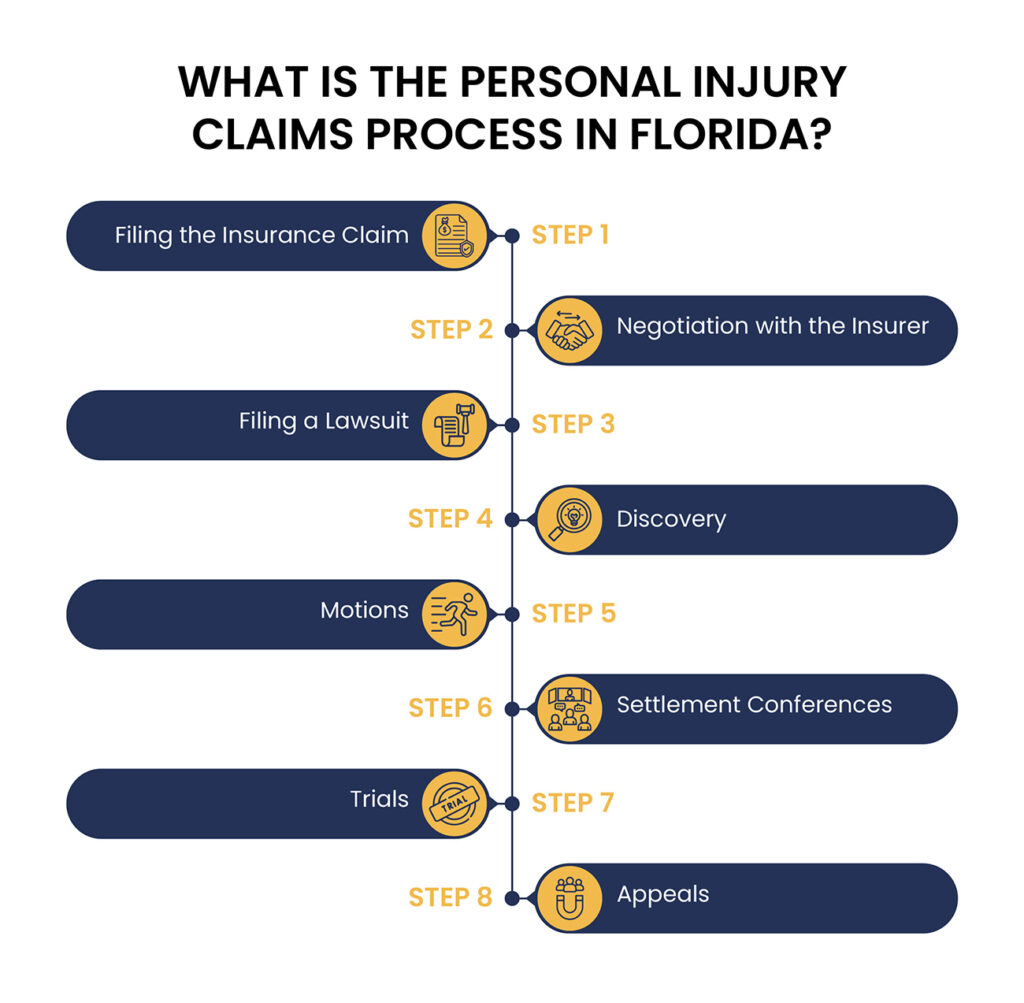
Before going to court or entering a negotiation, the injured party files an insurance claim. For auto accidents, you file a claim with your insurer, and it subrogates against the other company. In other situations, such as a slip and fall, you may file a claim directly.
It’s wise to consult a personal injury lawyer before filing a claim directly and immediately after an auto accident. What information you provide has a material impact on whether the claim is approved and for how much.
By working with counsel from the start, you increase the chance of receiving a favorable settlement sooner.
Insurers try to settle claims for less. Accordingly, you must push back against a first, low offer and demand total compensation. Often, a personal injury lawyer convinces the insurer to settle for a reasonable figure without going to court.
However, the insurer may continue to offer a short settlement, making it necessary to file a lawsuit.
Lawsuits start with a complaint. A personal injury lawyer composes a complaint that outlines what occurred and explains the legal basis of the suit. The complaint usually names more than one defendant, such as the other motorist and that person’s insurer.
The defense then files an answer, where the defense often denies liability and disputes items in the complaint.
Discovery is a mult-step process where each side gathers evidence to support its legal position. Your personal injury lawyer will seek documentary evidence, such as accident reports and medical records. Also, physical evidence, such as the vehicles from a car crash, may be examined. Each side must furnish the other with the evidence it plans to use in court.
After the initial evidence gathering, lawyers present witnesses with interrogatories, which consist of written questions they must answer under oath. Additionally, attorneys require witnesses to affirm or deny certain material facts on paper and under oath.
Claims often settle sometime in the discovery process, shortly before or after depositions. Depositions are face-to-face interviews of witnesses by opposing counsel. They are time-consuming, expensive, and risky. As a result, the defense sometimes becomes motivated to settle before depositions. Also, when depositions go poorly for the defense, they may reconsider their settlement parameters.
During the course of a suit, either side may file pre-trial motions. For instance, the defense may file a motion for summary judgment. This motion seeks a case dismissal based on the plaintiff’s claim having no merit and a trial being unnecessary because no material facts are in dispute.
Your personal injury attorney strategizes early on to ensure that the defense never has cause to win a motion for summary judgment.
While many cases settle out of court through a series of telephone discussions, some situations require a conference for the parties to come to terms. Judges often order settlement conferences to resolve cases without a lengthy trial. Success rates for plaintiffs at this stage are very high. However, either side is free to end the conference and proceed to trial.
Few personal injury cases end up at trial. For the most part, the plaintiffs can prove the defense liable. Because of this, insurers prefer to settle without the expense of a trial. However, if the defendant unfairly denies liability and refuses a reasonable settlement, a jury trial can result in a judgment forcing him to pay what the clam’s worth.
Either side can appeal in a civil case. Appeals may seek to overturn a verdict or alter an award. Some cases settle during the appeals process.
Insurance companies invest heavily in legal defense. They understand they can reduce claims payouts by disputing them and offering low settlements. Personal injury attorneys fight against this practice, taking the claim to court when necessary to compel a just result.
In personal injury law, the burden of proof rests on the plaintiff. The injured party must show that the defendant acted negligently and that negligence caused the injury. Useful forms of evidence include medical records, accident reports, police reports, witness statements, cellphone photos or video, surveillance recordings, physical evidence and other proofs.
Personal injury lawyers investigate accidents to gather the evidence needed to prove negligence and win their clients the compensation to which the law entitles them.
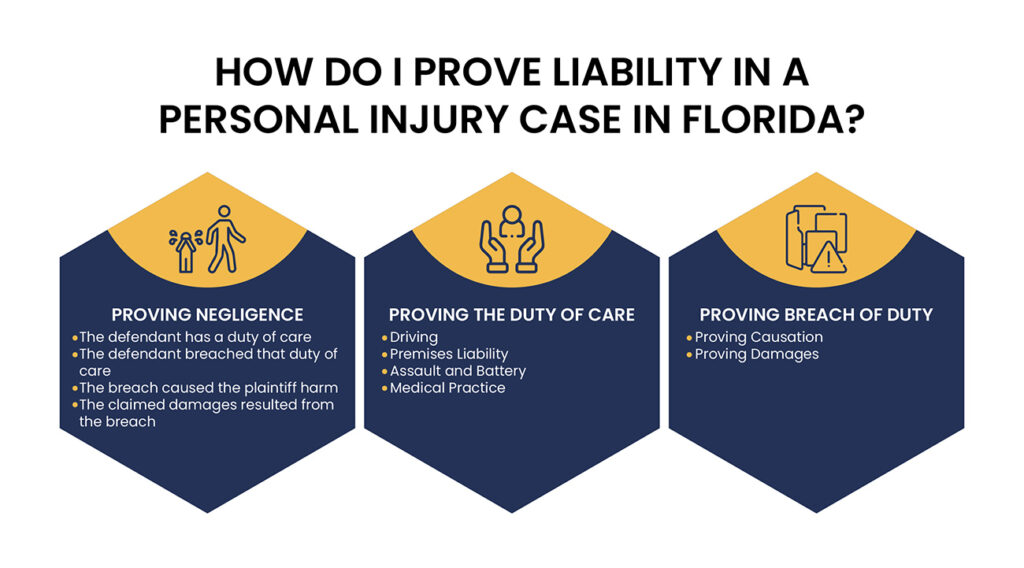
To win a personal injury lawsuit, the plaintiff must prove four elements:
Plaintiffs receive court awards only if they prove all four elements by a preponderance of the evidence. A preponderance of the evidence means more likely than not. Accordingly, if a jury believes it’s more likely than not that the four elements are true, it finds for the plaintiff.
A preponderance of the evidence departs markedly from the reasonable doubt standard applied in criminal law. Persons accused of a crime should be found not guilty even if the jury thinks they are more likely than not guilty, but a reasonable doubt still exists.
Also, criminal law requires mens rea (guilty mind) for a conviction. Prosecutions fail if there is reasonable doubt about the defendant’s intent to commit a crime.
Civil law requires no mens rea. In personal injury, most claims are based on accidents. While the defendant may be civilly liable for causing the injury through negligence, no mens rea exists, so there is no crime.
However, some personal injury claims result from criminal conduct by a defendant, in which case he faces both civil and criminal penalties. For instance, an assault is an intentional action. Clearly, mens rea is present, making a prosecution likely, and the victim is free to pursue a coincident civil judgment against the offender.
Proving duty of care is simple in many personal injury cases because the law presumes it. In essence, a duty of care is a legal responsibility to avoid harming others. The duty of care governs both actions and inactions. For example, speeding is an action that violates the duty of care, while failing to brake is an inaction that violates the duty of care.
Some situations where the duty of care applies include the following:
All drivers have an assumed duty of care towards others.
Owners of residential and commercial properties must ensure people on their property remain free of safety hazards.
All people have a presumed duty to avoid hurting people with their fists.
Medical personnel have a duty of care toward patients. Failure to follow established medical standards and harming a patient subject them to liability.
Establishing a duty of care represents only the first step. Next, a plaintiff must show that a breach of the duty of care occurred. Injured parties with the most grievous wounds cannot prevail without this element.
For instance, a surgeon has a duty of care toward patients. However, more than a good outcome is needed to establish a breach of duty. No guarantees exist in surgery. A surgeon can do everything correctly and the patient may still suffer a poor result, such as when a heart surgeon fails to save a critical patient’s life. Though the patient died, the surgeon may be blameless.
On the other hand, if the surgeon deviated from accepted medical standards, then the doctor breached his duty of care.
While proving a breach is elemental, it is not enough. The plaintiff must also show that the breach caused the plaintiff’s injury.
In some cases, causation is obvious. For example, a driver who hit another vehicle head-on, sending the other driver to the hospital with life-threatening wounds clearly caused injury to the plaintiff.
But other cases require additional work to establish causation. For example, a doctor may have breached his duty of care by departing from medical standards during surgery.
Nonetheless, a departure from medical standards does not automatically hurt the patient. A bad outcome could be unrelated to the breach. To prove a medical practice case, the plaintiff needs to demonstrate the link between the departure from standards and the harm.
Finally, the plaintiff must prove damages. Florida personal injury law permits plaintiffs to seek economic and non-economic damages. Monetary damages include medical bills and loss of income, while non-monetary damages encompass pain and suffering, emotional distress, and loss of enjoyment of life.
To win these damages, the plaintiff must prove that medical bills, lost income, pain, and other damages stem from the negligence of the defendant.
Establishing the four elements of a personal injury claim allows plaintiffs to seek redress in court for their damages. When plaintiffs have clear and convincing evidence of negligence by the defendant, they tend to win generous awards. In addition, most juries have sympathy for injured people and want them to receive compensation for their suffering.
Insurance companies are in business to make a profit. Because of this, they have the incentive to minimize claims payouts. For this reason, accident victims should understand how insurance companies handle personal injury claims and the potential pitfalls awaiting injured parties.
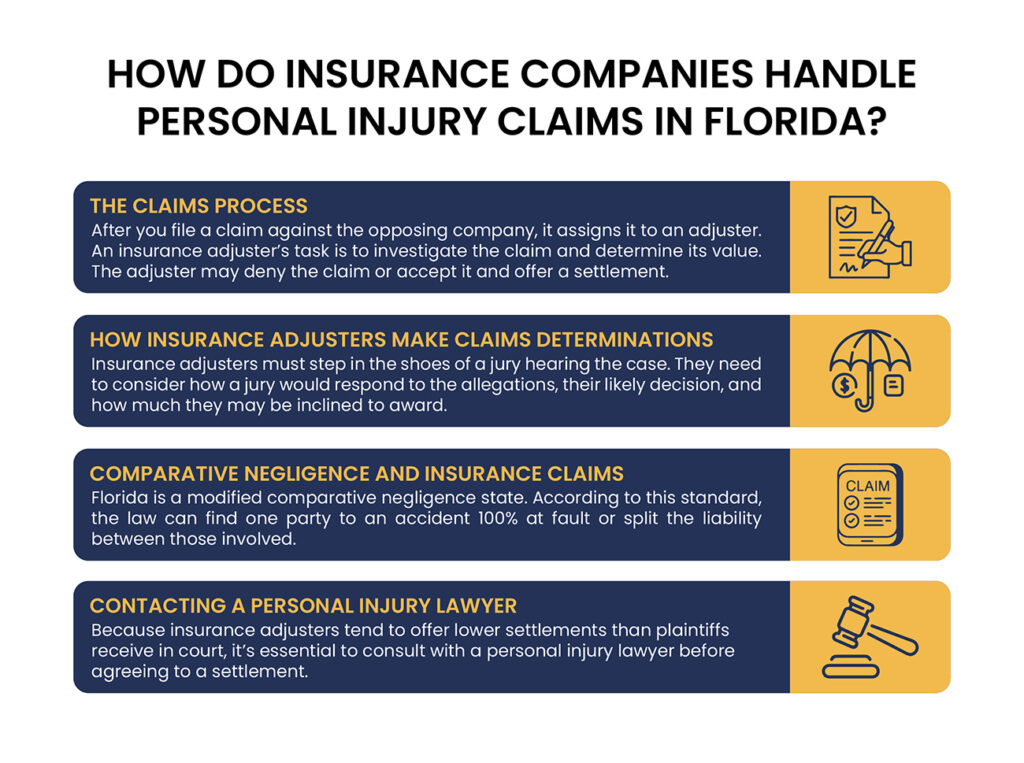
After you file a claim against the opposing company, it assigns it to an adjuster. An insurance adjuster’s task is to investigate the claim and determine its value. The adjuster may deny the claim or accept it and offer a settlement.
It’s important to understand that the insurance adjuster works for the opposing insurance company. Because of this, the adjuster must serve the best interests of his employer. Therefore, insurance adjusters tend to make claims decisions that favor the company rather than the claimant.
Insurance adjusters have a dual mandate. Their employers want them to control costs by limiting claims amounts. However, insurers also want them to avoid personal injury lawsuits. Once a suit is filed, the company is on the hook for the costs of defending it, which could outweigh a reasonable settlement. Therefore, the adjuster tries to strike a balance that limits payouts while avoiding litigation.
Insurance adjusters must step in the shoes of a jury hearing the case. They need to consider how a jury would respond to the allegations, their likely decision, and how much they may be inclined to award.
There is both art and science in predicting how a jury may find. For instance, when the evidence of negligence is clearly against them, adjusters must consider what a jury may award for economic and non-economic damages. Figuring monetary damages is more like a science. Concrete numbers, such as medical bills and missed time at work, allow for a neat calculation.
On the other hand, non-monetary damages, including pain and suffering, and emotional distress, are harder to predict. Juries have more leeway and may be more or less inclined to find for a big award, making this determination more of an art.
Insurance adjusters also must view the claim in terms of policy limits. The insurer’s liability ends when the claim reaches the policy limit. Any amount over is the responsibility of the defendant unless he has an umbrella policy that kicks in when his regular insurance limit is reached.
Also, the adjuster must also view the claim in terms of the strength of the case. When the plaintiff has a mountain of evidence, adjusters know they have little chance of prevailing at trial and may offer a higher settlement amount. On the other hand, the adjuster may deny a weak claim, figuring the plaintiff may drop the matter rather than proceed to court.
Florida is a modified comparative negligence state. According to this standard, the law can find one party to an accident 100% at fault or split the liability between those involved. For example, a court may decide a motorist is 100% at fault for causing an accident by failing to yield. On the other hand, if there is evidence that the other driver was speeding, the court may reduce the motorist’s liability to 80%.
When settlements or awards split negligence between the parties, the plaintiff receives less compensation. In the example above, the plaintiff would lose 20% of his damages if the court reduced the defendant’s liability to 80%.
Knowing this, insurance adjusters take a biased view toward comparative negligence, tending to assign excessive amounts of comparative negligence to the plaintiff.
Because insurance adjusters tend to offer lower settlements than plaintiffs receive in court, it’s essential to consult with a personal injury lawyer before agreeing to a settlement. Your personal injury attorney will evaluate your claim and any settlement offer, determining if the insurer is offering full compensation.
If the settlement is short, your personal injury attorney can open negotiations with the insurance company, demanding that they raise the settlement to a reasonable level. The fact you have an attorney can induce insurers to provide a better offer because they know they will end up in court if they insist on lowball figures.
However, sometimes insurers only settle once a lawsuit is filed and proceeds through a substantial portion of the court process. When this occurs, your personal injury lawyer will file a lawsuit and work to prove your claim and damages.
Defense lawyers look for any piece of evidence they can use to decrease your damages or win the case. Therefore, it’s key to avoid pitfalls that help them build a defense. To protect your claim, always seek medical attention and comply with treatment plans, avoid talking or posting online about your claim, and sign no agreements without legal counsel.
Below we detail the common mistakes that can ruin your personal injury claim:
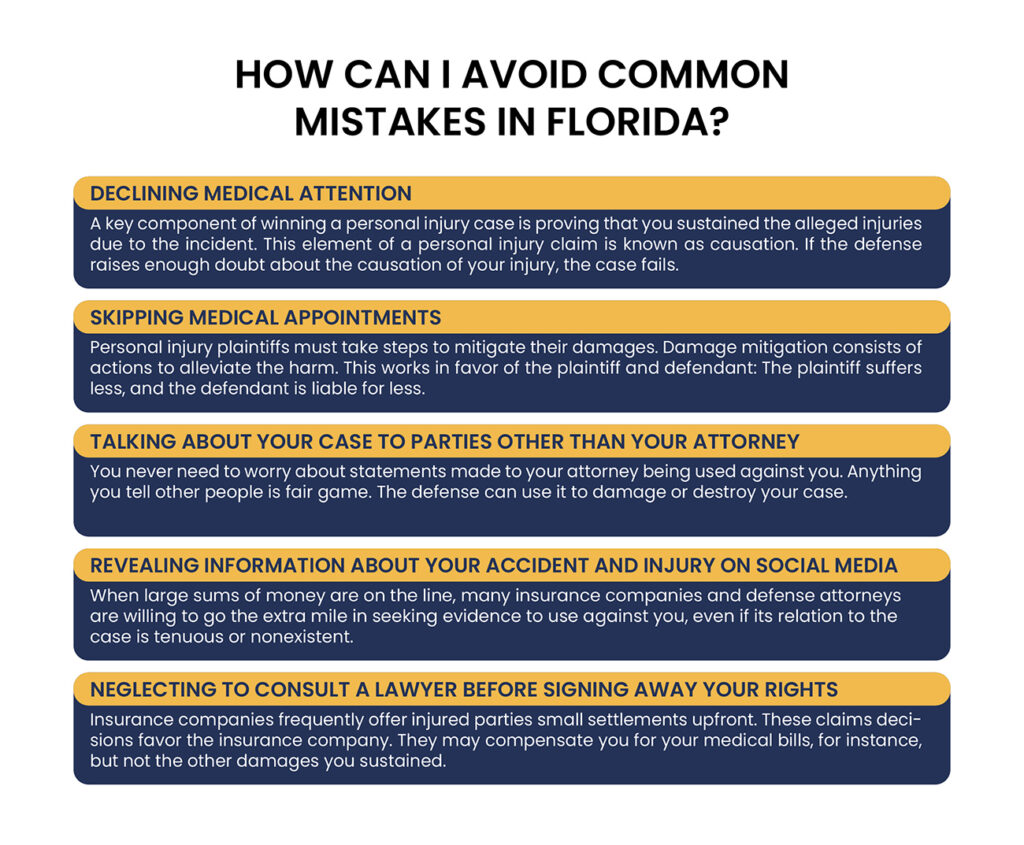
A key component of winning a personal injury case is proving that you sustained the alleged injuries due to the incident. This element of a personal injury claim is known as causation. If the defense raises enough doubt about the causation of your injury, the case fails.
For example, suppose a personal injury plaintiff slipped on a wet grocery store floor but declined medical attention, believing the injury was not serious. Then, over the next few days, the plaintiff began experiencing knee pain. He then seeks medical attention, and doctors determine he suffered a knee injury from a fall.
But was the fall at the store the one that caused the injury?
If it was, wouldn’t a reasonable person have sought a prompt medical evaluation to determine if there was damage? Perhaps the injury was from a subsequent fall in the plaintiff’s home, and he is now trying to blame the supermarket.
Receiving immediate medical attention prevents the defense from using these arguments. With an emergency room report from the day of the incident, the causation can be established without a doubt.
Personal injury plaintiffs must take steps to mitigate their damages. Damage mitigation consists of actions to alleviate the harm. This works in favor of the plaintiff and defendant: The plaintiff suffers less, and the defendant is liable for less.
Attending medical appointments is an integral part of mitigating damages. If you skip them, your injury may become worse as a result. The defense can then say you refused medical treatment, so it is not liable for the resultant costs and pain.
You never need to worry about statements made to your attorney being used against you. Anything you tell other people is fair game. The defense can use it to damage or destroy your case.
For instance, imagine the opposing insurance company contacts you by telephone, and the adjuster says he wants to settle the claim quickly. He then poses questions about how the accident happened. In an auto accident case, he may ask if you were speeding. If you confirm you were above the limit, he then has an argument that you have partial responsibility. Thus, your award should be smaller. However, in reality, you may have been driving with the flow of traffic very near the speed limit, and your speed had nothing to do with causing the collision.
When large sums of money are on the line, many insurance companies and defense attorneys are willing to go the extra mile in seeking evidence to use against you, even if its relation to the case is tenuous or nonexistent. Social media presents a particular danger because it is easy to access, and data can be presented out of context.
For instance, if you post an account of your accident on social media, the defense can scour it for even a single word it can twist to its advantage. For example, if you tripped at a mall, even saying something as seemingly innocuous as you were in a rush could give the defense an opening to claim you tripped because you were hurrying and careless.
Social media posts can also work against proving your damages. For example, imagine you post about how you enjoyed a hiking trip. Though the injury symptoms may have been tolerable enough for you to engage in this activity, the defense could still use it to shed doubt on your claim for pain and suffering and loss of enjoyment of life.
Insurance companies frequently offer injured parties small settlements upfront. These claims decisions favor the insurance company. They may compensate you for your medical bills, for instance, but not the other damages you sustained. When you accept one of these inadequate settlements, you sign away your right to bring legal action.
Consult a personal injury attorney before signing any agreements. You may have more negotiating room than you imagine, and an attorney can help you define a target settlement figure. In addition, your case may need to go to court for you to receive a fair settlement.
Personal injury cases hinge on proving the defendant caused you harm and the damages relate to this harm. By talking about the case or posting on social media, you risk providing the defense with evidence, even if taken out of context. The best way to avoid mistakes that can damage or destroy your case is to consult a personal injury attorney as soon as possible.
Your personal injury attorney guides you through the entire process, from the initial insurance claim to filing a lawsuit to trial to appeals. But in most cases, the claim settles sometime between filing the insurance claim and the trial date.
The legal process moves in a logical progression. First, evidence is collected, then motions may be filed, and the case settles or goes to trial. A settlement can occur at any time, even before the complaint is filed or during the appeals process.
The steps that must be navigated in a Florida personal injury claim include the following:
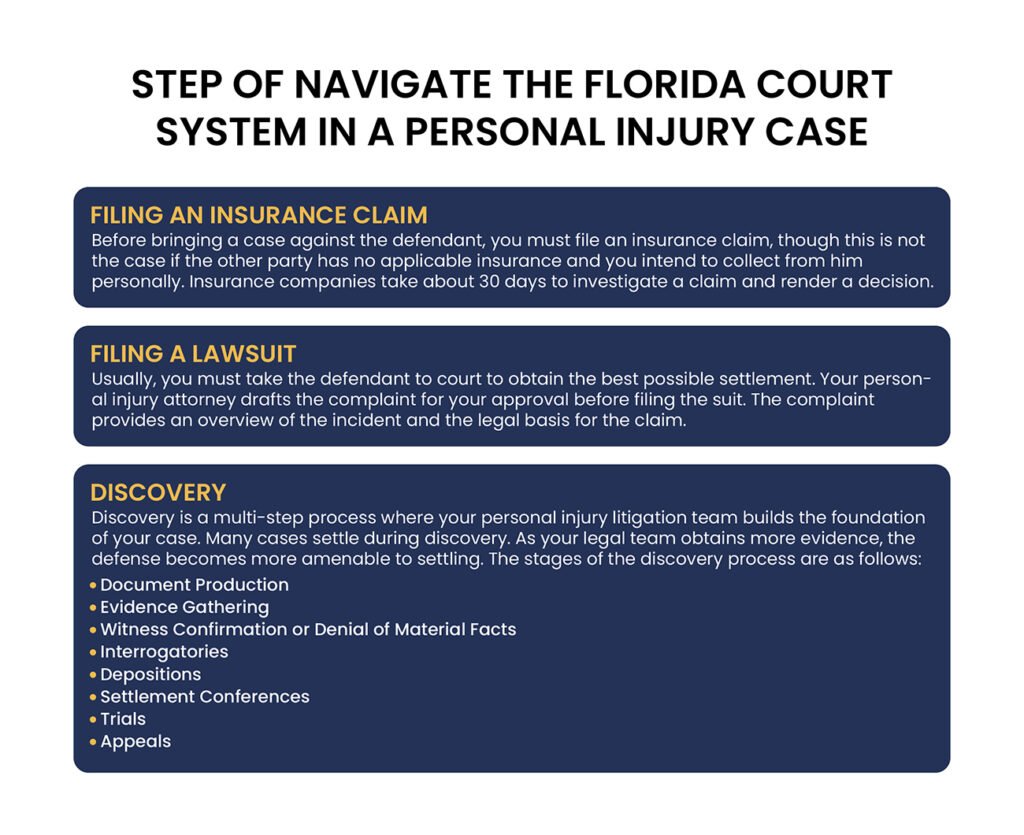
Before bringing a case against the defendant, you must file an insurance claim, though this is not the case if the other party has no applicable insurance and you intend to collect from him personally. Insurance companies take about 30 days to investigate a claim and render a decision.
If the insurer approves the claim, it will offer a settlement amount. You must seek legal counsel before agreeing to a settlement. If you do not, you may sign away your right to bring a civil action in exchange for inadequate compensation.
Usually, you must take the defendant to court to obtain the best possible settlement. Your personal injury attorney drafts the complaint for your approval before filing the suit. The complaint provides an overview of the incident and the legal basis for the claim.
The defense responds with an answer, where it generally denies the allegations.
Discovery is a multi-step process where your personal injury litigation team builds the foundation of your case. Many cases settle during discovery. As your legal team obtains more evidence, the defense becomes more amenable to settling. The stages of the discovery process are as follows:
Both sides must provide the opposition with their documentary evidence. Also, lawyers may seek additional documents from third parties.
Attorneys continue gathering other types of evidence during discovery, such as physical evidence, additional witnesses, or video recordings.
Attorneys may request the other side’s witnesses to confirm or deny specific material facts. These requests are in writing, and the witnesses respond on paper under oath. Your personal injury attorney guides you through this process so you confirm and deny facts accurately without harming your claim.
Interrogatories are written questions prepared by attorneys and sent to the other side’s witnesses. The witnesses must respond with written answers under oath. Some interrogatories are standard in personal injury cases, while attorneys prepare others for a specific situation. Your personal injury lawyer helps you answer these questions so you avoid any traps set by the defense.
Depositions are in-person interviews of witnesses conducted by opposing counsel. They can be dispositive, so your personal injury attorney prepares you extensively for your deposition and objects to any inappropriate questions during the interview. Your litigation team also spends long hours generating questions and lines of inquiry for the other side’s witnesses.
Many cases settle before depositions. Often, the defense feels it is not worth the cost and risk of going through the deposition process and decides to cut its losses and offer an attractive settlement. On the other hand, information revealed during depositions can also motivate the defense to settle.
Before trial, judges often order the parties to engage in settlement conferences. These meetings provide a forum for the litigants to find areas of agreement and disagreement and try to reach a figure acceptable to both.
Trials rarely occur in personal injury cases. However, a trial may be necessary when material facts remain in dispute, or the defense is obstinate. Your litigation team participates in jury selection to ensure the panel is unbiased and receptive to your case. It presents opening arguments, presents evidence, examines witnesses, cross-examines defense witnesses, and offers a convincing summation.
In personal injury law, appeals can come from either side. They may be based on errors by the trial court and seek a new trial or an adjustment to the award. Because appeals can take many years and drastically alter the outcome, many cases settle during this time.
Pursuing a personal injury claim in Florida courts is a time-consuming, slow, step-by-step process. Most cases settle in 1–3 years, with a few going to trial. Your litigation team guides you through each step as it prepares and presents your case.
Personal injury cases in Florida have the power to win the plaintiff full compensation for economic damages and general damages, such as pain and suffering and emotional distress. However, many injury victims fail to realize that the law entitles them to substantial compensation. As a result, they neglect to consult a personal injury attorney.
After an injury, always consult a legal professional. The last thing you want is for common myths and misconceptions to deter you from pursuing the damages owed to you. Common myths and misconceptions include the following:
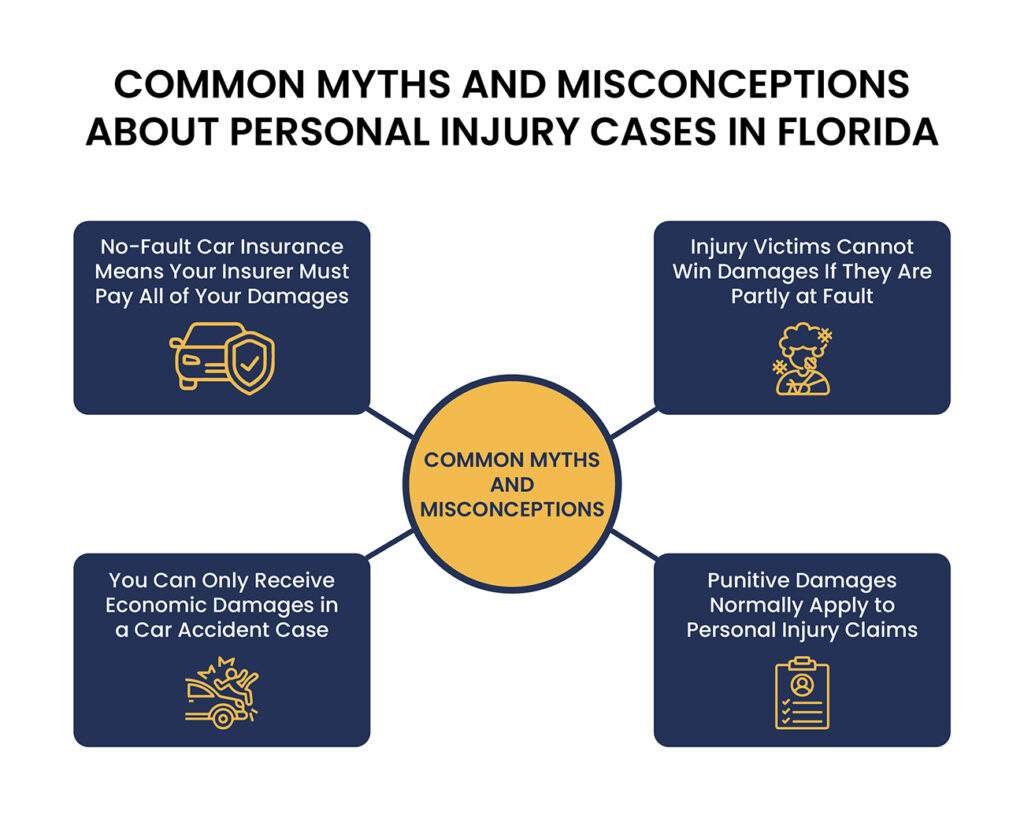
Unlike many states, Florida car insurance law requires carriers to pay certain damages incurred by their customers regardless of fault. Accordingly, each party’s insurer simply pays these damages to their customer, and the carrier cannot seek reimbursement for these expenses from the other party’s insurer, even if the other party is 100% at fault.
However, no-fault vehicle insurance applies only to economic damages. Therefore, liability for general damages is fully transferable.
Under Florida law, economic damages consist of harms that have a direct financial impact on the plaintiff. In car accident cases, these include the following:
Sometimes, an accident victim’s damages are all economic. In that case, a person injured in a car accident receives full compensation from their insurer, so they need not pursue the other motorist for additional damages. Litigation comes into play only if the insurer refuses to pay all economic damages.
Most auto accidents with injuries result in more than monetary damages. Injuries cause pain, reduce the quality of life, and infect victims with distress. All these general damages are compensable, but you must pursue the at-fault driver in court to win them. As a result, lawsuits are still necessary under Florida’s no-fault car insurance system when serious injuries are involved.
Many people mistakenly believe they can only receive economic damages from a Florida car accident. As a result, they may accept the settlement from their insurer and fail to pursue general damages. For this reason, always consult a personal injury attorney after an auto accident injury.
Florida is a comparative negligence state. Comparative negligence allows injury victims to pursue damages when they are partially at fault. However, courts reduce the award according to their findings of the degree of partial responsibility.
For instance, suppose a negligent driver strikes another vehicle by executing an illegal turn. Clearly, that motorist is primarily at-fault for the accident. However, the other driver may have contributed to the accident by speeding. In this scenario, the court determines a percentage of fault attributable to the plaintiff and reduces the award accordingly.
For example, the court may determine that a plaintiff has $100,000 in damages and a 20% share of the blame. In that case, the court reduces the plaintiff’s award to $80,000.
Punitive damages apply only to a small minority of personal injury cases. The law presumes that economic and general damages sufficiently compensate the victim for economic and non-pecuniary losses. Therefore, in most cases of personal injury due to negligence, the awards focus on compensating the victim rather than punishing the defendant.
But punitive damages do apply in cases where the defendant’s outrageous conduct harmed the plaintiff. While many plaintiffs’ lawyers argue that many types of misconduct constitute outrageousness, some common situations that result in punitive damages include drunk or drugged driving, assault, and other actions that show a wanton disregard for the safety of others.
For instance, suppose a business decided to save money by dumping toxic waste into a river. Soon, people in the area grow sick because the illegally dumped waste contaminates the drinking water. Yet, the company continues its illegal dumping despite these horrific consequences and makes efforts to cover its tracks.
In this scenario, little doubt can exist as to the company’s wanton disregard for the safety of others, the illegality of its actions, and its intention to continue dumping despite the harm caused and conceal its misdeeds. Punitive damages clearly apply to such a case.
Common myths and misperceptions often discourage injury victims from pursuing the justice they deserve. Never let this happen to you. Consult a personal injury attorney to understand your rights fully.
Florida represents one of the few states with a no-fault car insurance rule. According to this statute, each party’s insurer must pay its client’s economic damages regardless of fault. While this simplifies the claims process for monetary damages, it complicates matters regarding general damages.
General damages consist of the non-monetary harms caused by a personal injury, including pain and suffering, emotional distress, loss of enjoyment of life, and loss of consortium. When an injury causes significant general damages, such as when someone develops paraplegia, general damages can be many times higher than substantial economic ones.
To win general damages, the plaintiff must bring a lawsuit against the person who caused the accident and their insurer. The defense may deny that it is the cause of general damages and argue that an award cannot be based on a multiple of economic damages it perceives as too high.
For other types of personal injuries, such as slip and fall accidents, the plaintiff’s insurer does not step in and pay its client’s economic damages. Instead, the defense bears responsibility for all damages.
However, that does not mean a court will award all damages claimed. The plaintiff must prove negligence, show the related damages, and overcome comparative negligence defenses.
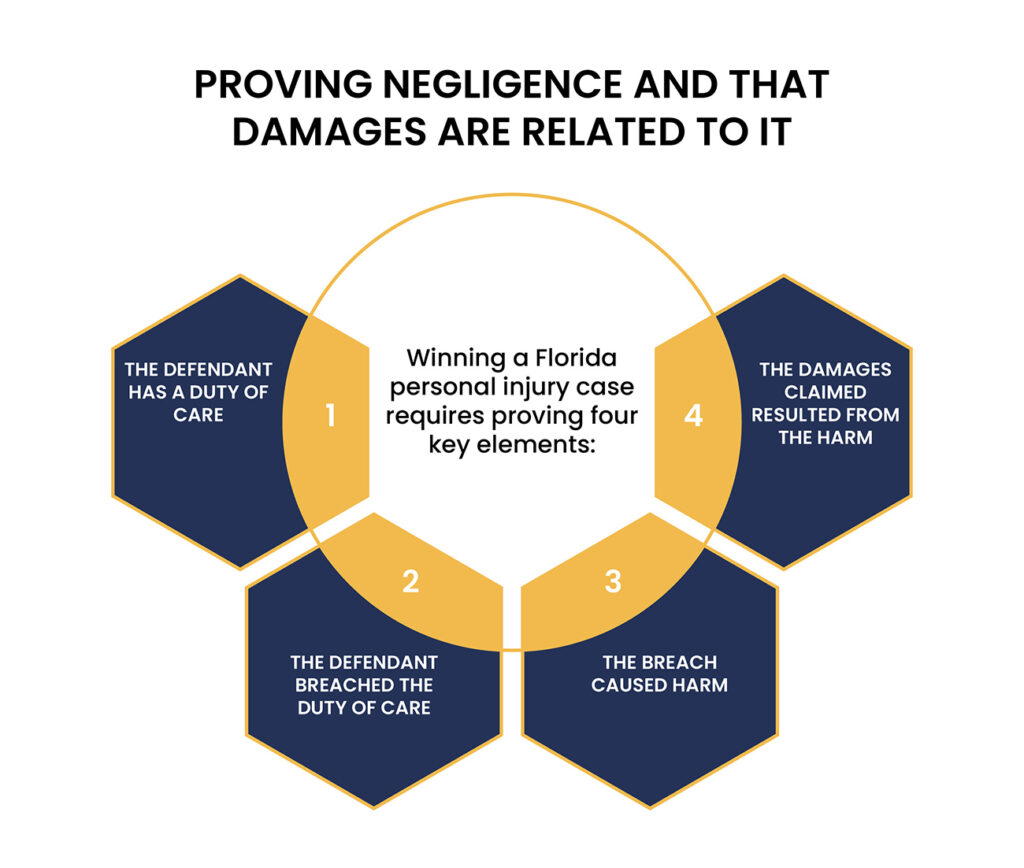
Winning a Florida personal injury case requires proving four key elements:
In American law, a duty is an obligation to protect another against unreasonable risk of injury. In many cases, the duty of care is obvious, making this element a foregone conclusion. For example, all drivers have an automatic duty of care to all others while operating a motor vehicle.
Defendants breach a duty of care when their conduct departs from reasonable standards and endangers others. For example, a drunk driver breaches the duty of care when he enters the roadway, as does a speeding driver when he ignores the posted limit.
While it’s relatively easy to demonstrate a breach of the duty of care when dealing with drunk or speeding drivers, other cases require substantial investigation to prove the breach. For instance, residents of a town may become ill due to toxins in the drinking water. But how did the toxins get there?
An extensive investigation would be needed to determine the cause of the problem and identify the appropriate defendants. A lawsuit provides plaintiffs with the tools and process to discover who has responsibility. For example, evidence may come to light that a manufacturing company has been illegally dumping toxic waste that seeped into the drinking water, a clear breach of the duty of care.
In Florida, a plaintiff must prove actual harm to win a personal injury case. A breach without harm is not actionable as a personal injury case, though the violator may face other sanctions meant to stop the breach and protect the public from future harm.
For example, if the EPA discovers a company illegally dumps toxic waste. In that case, it will take enforcement measures, such as fines and legal action, to force the company to cease illegal dumping. However, the company faces a personal injury lawsuit only if its shady practices caused actual harm: The dumping must be the cause of someone suffering illness or injury.
Many damages, such as medical bills, lost income, and pain and suffering, are compensable in a personal injury case. The onus is on the plaintiff to demonstrate that any claimed damages stemmed from the alleged breach of the duty of care. For instance, medical records are needed to prove that the treatments administered relate to the injury.
Defense attorneys often try to transfer a portion of the blame onto the plaintiff because the law allows for the reduction of awards given to plaintiffs who are partially at fault. However, in many cases, these defenses fail due to a lack of cogent arguments or clear and convincing evidence.
Litigating a personal injury claim in Florida can be a Herculean endeavor when large sums of money are involved. However, it’s vital to never give up the fight. The law is on your side if you suffer an injury because of another person’s or company’s negligence.
Your consultation with an attorney member of Rosen Injury Law is FREE! You can connect to a representative by calling 954-451-0532 or filling out the contact form below.
100% Privacy Guaranteed
 Table of Contents
Table of Contents